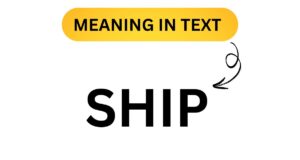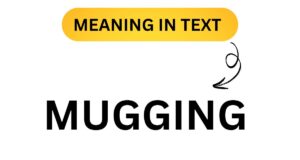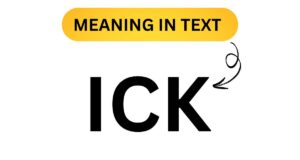“ILY Meaning in Teen Slang: A Guide for Parents” – if you’ve seen these three little letters pop up in your teen’s texts and wondered what on earth it means, you’re not alone. As a parent, it’s easy to feel lost in the sea of teen slang, but don’t worry we’ve got you covered.
In this guide, we’ll break down what ILY really means, how it’s used, and why it’s important for you to understand the language your teen is speaking. So, grab a cup of coffee and let’s dive into the world of teen texting because knowing what ILY means could be more important than you think!
So… What Does ILY Really Mean?
It’s simple, really. ILY stands for “I love you.” There, you’ve got it! That wasn’t so bad, was it? In fact, it’s a cute, quick way for teens to express affection or care, much like sending a heart emoji or a “<3” when words are too much and time is of the essence. ILY is shorthand for love – the kind of love shared between friends, family, or even the person they just started chatting with on TikTok.
Now, before you get all teary-eyed, thinking your teen is texting their friends with deep emotional intensity, let’s keep it in perspective. ILY isn’t reserved for romantic declarations or heart-to-heart confessions (though, sure, it can be used for that too). It’s a friendly, casual expression that’s tossed around like a high-five in text form. Think of it as saying, “You’re awesome, and I appreciate you!” with way fewer words.
The Sweet, Sassy World of Teen Conversations
To really get the gist of ILY, let’s look at a couple of totally realistic examples of how it’s used in everyday teen conversations. Grab some popcorn; these texts are more dramatic than the last season of that show you and your teen binge-watch together (you know the one – don’t pretend you don’t).
Scenario #1: The Busy Besties
Teens: texting their BFFs in the middle of their busy days.
Teen A: “Yo! How’s your project going?”
Teen B: “Ugh, it’s so stressful. I have like 50 pages left and no time.”
Teen A: “Hang in there, you’ve got this. ILY, you’re amazing!”
Teen B: “ILY too, you’re my lifesaver.”
Here, “ILY” isn’t a dramatic love confession; it’s just two best friends supporting each other in a tough moment. It’s like giving a virtual hug, but with 50% fewer awkward arm flailing motions.
Scenario #2: The Unexpected Compliment
Teens: texting after a big test result or success.
Teen A: “I heard you got an A on your chemistry test! That’s awesome.”
Teen B: “Yeah, but it was so hard. I thought I was gonna fail for sure.”
Teen A: “Nah, you’ve got this. I’ve always known you were a genius. ILY for being the smartest person I know!”
Teen B: “ILY too, thanks for the support!”
Here, “ILY” is a casual way of saying, “You’re awesome, and I’m proud of you!” It’s the digital equivalent of patting someone on the back without the risk of accidentally getting your hand stuck in their hair.
Why Do Teens Love Using ILY?
Alright, let’s get to the fun part: Why do teens insist on texting “ILY” instead of just saying “I love you” out loud? Well, part of it is just that classic teen need to do everything in a way that feels unique and fast. We all know that texting is like the speedway of communication—everything needs to be quick, efficient, and able to fit into a 140-character tweet.
Plus, “ILY” fits the bill perfectly: three letters, minimal effort, maximum impact. And let’s be honest, when you’re sending a quick text to your BFF to let them know they’re amazing, you don’t need to go into a long-winded speech about your undying affection. “ILY” says it all.
And let’s not forget that “ILY” also has a layer of coolness, like a secret code that only the texting-savvy understand. By using it, teens are participating in a cultural moment. It’s like being part of an inside joke, but everyone’s in on it.
Is ILY Dangerous? Will It Lead to My Teen’s Untimely Doom?
Okay, we get it. As a parent, when you see your child use slang that seems to be all about love, your brain might immediately jump to conclusions. “What’s going on here? Are they texting a potential date? Are they sending love notes in secret?”
Here’s the deal: ILY, in and of itself, is harmless. It’s used among friends, family, and in some cases, romantic partners just like a hug emoji or a quick “hey, I miss you” text. It’s sweet, it’s short, and it’s basically the digital equivalent of a smile.
However, it’s important to note that slang and abbreviations can sometimes take on different meanings depending on context. In some cases, slang can be associated with harmful behaviors, or it might be used inappropriately by kids trying to fit in with certain crowds or online groups. That’s where things can get tricky.
If you notice your teen using ILY in situations that raise a red flag—say, if it’s used to cover up risky behavior or to connect with people who seem to be encouraging harmful habits—it might be time to step in. Don’t worry, we’re not suggesting you overreact. Instead, just be aware, keep communication open, and don’t be afraid to ask questions when you see something that feels off.
Why Parents Should Keep an Eye on Slang Use
While ILY is mostly innocent, there are other slang terms out there that might be associated with more troubling behavior. And no, we’re not talking about “YOLO” here. We’re talking about things that could indicate your teen might be involved in things they shouldn’t be—things like bullying, drug use, or even engaging in online threats. It’s not to freak you out, but just to remind you that being a parent means staying informed.
You don’t have to be fluent in every new term, but a little knowledge can go a long way. Consider using tools like parental control apps to monitor what your teen is chatting about online. These apps can help you stay ahead of potentially harmful conversations or slang without being the “fun police.” Just make sure your kid knows you’re keeping an eye out, so they don’t feel like you’re secretly reading their texts from behind the curtain.
What Should You Do If You’re Concerned About Slang Use?
Here’s the thing: If you see your teen using slang that feels concerning or if you’re unsure about what something means, ask! Engage in an open, non-judgmental conversation. If they feel comfortable with you, they’ll explain it to you. You might even get a chuckle out of the fact that their idea of a dangerous phrase is as simple as “ILY.”
If things are a little trickier and you feel like you need more control over their online behavior, consider parental control apps or even setting boundaries around how much time they spend online. The goal is to protect them while giving them the freedom to express themselves and communicate with their friends.
Conclusion
So there you have it! ILY is just another cute acronym in the vast ocean of teen slang. It’s nothing to stress about (unless you start seeing your kid’s text inbox filled with cryptic messages from mysterious strangers, in which case…okay, maybe we’ll talk). But in most cases, it’s just a quick, friendly way for your teen to say “I love you” without getting all mushy.
Remember, staying informed about slang isn’t about spying or invading your teen’s privacy it’s about making sure they’re safe and that you understand what’s going on in their digital world.
Now, take a deep breath, laugh at the fact that you just spent 30 minutes Googling “ILY,” and enjoy the fact that you now know what it means. Go ahead, text your teen an “ILY” and see what happens. You might just be greeted with a “ILY too” and a smiley emoji in return.









